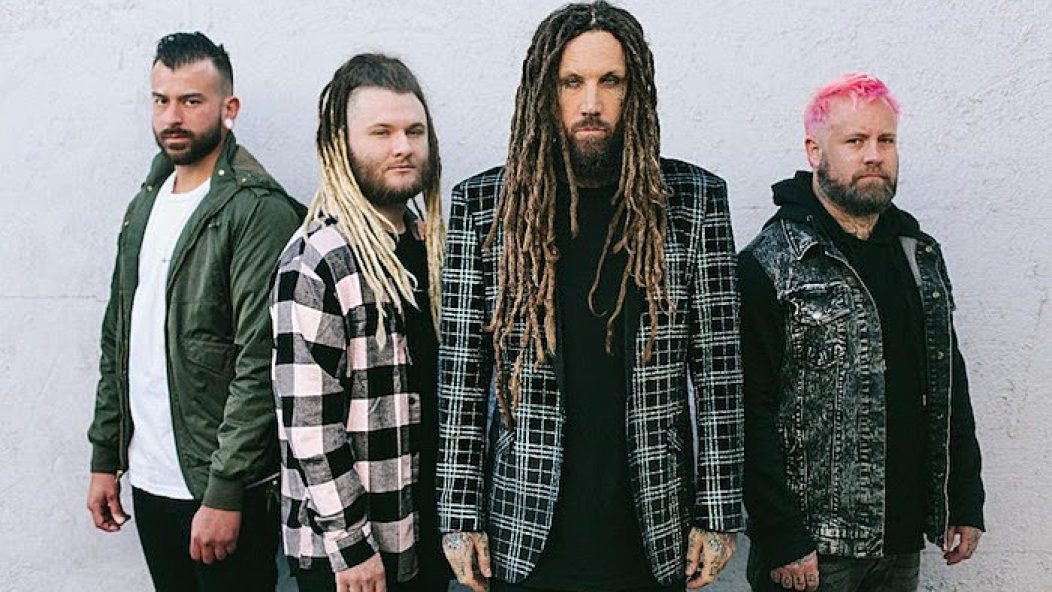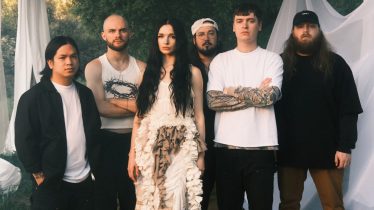
Love And Death are doing everything they can’t do in Korn and Breaking Benjamin
It’s been nearly eight years since Love And Death’s last album, Between Here And Lost, but the project’s return couldn’t have come at a better time. With scheduling difficulties being cleared due to the pandemic, Korn guitarist Brian “Head” Welch, longtime collaborator and Breaking Benjamin guitarist Jasen Rauch, J.R. Bareis and Isaiah Perez have finally been able to put a wrap on this new record.
It was years in the making, but together, the band have packaged an album filled to the brim with emotion, innovation and vigorous energy to match. It even has a few small surprises for fans, including special guest musicians, a cover of a DJ Snake track and more.
Read more: 50 most anticipated albums of 2021 in alternative, metal and beyond
With Perfectly Preserved arriving Feb. 12 via Earache Records, the band are also hosting a global album release streaming event with performances of tracks off of both albums, guest musicians and exclusive merch items.
In anticipation of the new album and livestream, we’ve brought Welch and Rauch together to discuss the new record, their history and their storied careers. Check out what they had to say below while you’re waiting for the new Love And Death album.
Let’s get right into it. Unlike the first album, Jasen, this time you’re a full member of the band, but there’s quite a bit of history between both of you. How did you initially meet?
BRIAN WELCH: I met Jasen through Rob Graves, who was a producer and writer for the band Red. Jasen co-founded Red. Is that right?
JASEN RAUCH: Yep, yep.
WELCH: So they co-founded Red and went on to do some great things. I was just a fan of the band, and they lived in Nashville. I took a trip out to Nashville, met with Graves and met the other guys in Red. Just a lot of people in the scene down there and started writing together and working on stuff.
Graves was going to produce my solo project, and I don’t know what it was. I just didn’t really jell with him. He’s very talented, but it’s just some people jell well, some people don’t. I put it aside, and then me and Jasen started talking later and started working on new music, so that was the first time I met Jasen and started working together. It was probably around 2010.
RAUCH: I remember when we started with that project, it started with me helping out just on the more technical side, engineering and things. It blossomed into, obviously, you and I are friends and then working together in a more creative space. Then the whole solo project evolved into being a more band-driven thing, which is when Love And Death became Love And Death.
This is going to be the first bit of new music with this project since 2016. What rejuvenated your interest in bringing Love And Death back?
WELCH: It was probably put aside for a year or two, and we started working on new music back in 2014, and we would just get together for a week or two. We brought in Keith Wallen, who is the other guitar player for Breaking Benjamin, and we started writing with him, J.R. Bareis, me and Jasen at my house around 2015.
It’s not like we put it aside. It just never finished because of crazy schedules. Getting this year that was just handed to us with nothing but time for all musicians really helped out because we had like half the record written. We’ve been working on this, and then COVID actually gave us the free time to write three more songs and finish the damn thing. It’s been a five-year process.
Read more:
RAUCH: Scheduling was the toughest part with our tour schedule. Even if you look back on it, Brian, we lived together for a hot minute, and our schedules were still opposite. We did two tours together, and just on the road, your schedule is crazy. It’s going back and forth with things going on other than just the show.
We had our meet and greets, soundchecks and then our own publicity and press on the side, and we just couldn’t make it work during those tours to keep putting the time into the project that it deserved. Like you said, that was the blessing in disguise with everything being shut down the way that it is in the entertainment industry and the world in general. It gave us the opportunity to go back to square one and say, “Well, what are you doing?” “Nothing?” “Me either.” It was a really good time to pour back into it.
WELCH: I was given the strength to can the trashy songs because I have an issue with that sometimes where I fall in love with the crap that I write. It’s like, “Oh, I created this. It’s your baby.” And then it’s an ugly baby, and you have to let it go. [Laughs.] I’m just joking.
As veteran musicians who’ve known what it’s like growing from playing in bars and struggling as a new band to where you are now, what are some of your favorite memories from when you were just starting out?
RAUCH: I miss the hustle. You have this thing where you’re paying your dues, [and] you’re not making anything. You’re probably losing money. You’re crashing at a friend’s house that you met on the road or sleeping in the van. We were just talking about our crew. There is no crew. It’s just you guys, and you’re so hands on. You’re so plugged in, and your entire life revolves around being and perfecting this thing that you’ve come up with. The cliche of you have your whole life to write your first album and two years for your second, that part is true.
I’ve seen a lot of musicians over the years that when it comes time for recording, they want that vibe. They want the nice studio. They want the big consoles and everything, but when we started, none of us had that. We sat in a garage and wrote. I miss that thing that drove you regardless because you weren’t going to stop. It didn’t matter how uncomfortable you were or how inconvenient it was or how tired you were—you did it. Sometimes as you get further into your career, you start to work a little harder to get that same kind of hunger. Those are the things that I think I miss sometimes.
WELCH: That’s really good, and I agree. We think back to junior high, and you never want to relive that again. That’s like touring and coming up for me. That’s cool. I appreciate that. I don’t necessarily miss it like Jasen. I don’t want to relive it because you have to remember, I lived it twice. I did it with Korn and then left Korn and stopped music for a while and then started Love And Death, so I did [it] with them, too. I wouldn’t change it for the world. It’s made me who I am today, and it’s built a lot of strength inside of me to just go for it, especially after losing the good life and walking away from Korn to start over. Man, that made me strong. Even my own dad was like, “Wow, you really hit bottom again.” [Laughs.]
RAUCH: I do agree with you. It’s the difference of riding your bike to work in the freezing cold, and then you get a car, and you’re like, “Yeah, I paid my dues, but I don’t want to ride my bike anymore.” Getting older now, I don’t know if I could do it again.
WELCH: I would much rather be a Whole Foods delivery person I think than do that again.
With the band taking a few years to piece the album together and wrapping it up during the pandemic, what was it like trying to put it together for release early next year?
WELCH: The label was like, “OK guys, here’s where we’re at. Everybody feels like they want to do this, so can we all agree to this date.” I looked at the date and was like, “Nope. Ain’t gonna happen.” I just didn’t think it was realistic, and I thought Jasen would totally agree with that. He hit back and was like, “I disagree. I think we can totally hit that date.” I like being given a goal. It really helps you focus. In my mind, I was like, “OK, we’ll work hard, but I’ll believe it if I see it.”
RAUCH: I work well with deadlines. It just gives you accountability to stay focused on things, but I think we had enough material to write a whole album before this one, with what we’re sitting on right now. We tracked drums for 20-something songs in total throughout the years. I think finding ourselves where we’re at and finding all of the songs that work together to complete the story sonically that match and take us in new directions, it’s all there.
We are excited to announce our global streaming event happening on release day of our new record “Perfectly Preserved”. Tickets and bundle packages are available now at https://t.co/DHsedmAjMk
•
•#loveanddeath #perfectlypreserved #newalbum #streamingevent #veeps pic.twitter.com/eQN13DDH86— Love And Death (@LoveDeathMusic) December 3, 2020
So I know with Love And Death, you have talked about how you have more creative freedom with what you can do than in Korn or Breaking Benjamin. What are some of the biggest things that you thought you were able to pull off on this album that wouldn’t work with your main projects?
RAUCH: Something I thought about the other day that I hadn’t really thought about until I was listening to the album on a jog was introducing other singers. Having someone else take the vocals, it would be much more different for Breaking Benjamin or Korn to say, “Hey Brian, you’re going to sing this song” or splitting it up in a way that Alice In Chains would back in the day. A song like “Would?,” Jerry [Cantrell] is all over that singing lead, and that would be more difficult with our bands, I think.
We’re not only able to take liberties with guest artists, but [we’re] using J.R. vocally a lot more, and that kid can sing. He’s got great pitch. He’s one of the best musicians I’ve ever met. To be able to plug that in and use him as more than just a guitar player was a pretty cool thing.
WELCH: Plus, the other thing is we had J.R. and me trading vocals on verses, and that’s on the whole album, trading back and forth. We have Lacey [Sturm], formerly of Flyleaf. We have Keith [Wallen] from Breaking Benjamin on a song. We have Ryan Hayes. I haven’t met him in person yet. So we have all of these things that we can do. If you think about songs like “White Flag”, it’s starting out with this cinematic type of feel and just going into screaming verses, and you couldn’t do that with our bands.
I feel we’ve got a cool team going where it isn’t going to be another eight years for a record. Unless no one even cares about it. But if people care about it, we can do something every three years or whatever. There’s room to grow. We’ll see. You fans out there show us if you like it, and if not, we won’t do it. [Laughs.]
You both have been openly supportive of discussing topics around mental health, which crops up in the lyrics on Perfectly Preserved. Why do you think awareness is important?
WELCH: Me and Jasen both have struggled with that. Honestly, most of the people I know, especially in the music business and in my band, there’s some form of mental health issue. If you think about icons like Jonathan [Davis] or Ben [Burnley] in Breaking Benjamin, they have a way just to pour their emotions into their words and articulate things that so many bands in our genre do.
That’s one of the reasons [why] the heavy music genre is here. It’s a gift for us. You have to remember all of us in these bands, big or small, we’re fans of this music. But we can create this thing that helps us all know that we’re not alone. I feel like even though my life is really good now, and I still have depression and whatnot sometimes, but even if I’m doing great, I love to sing about pain because I’ve come from pain. I’ve come from pain, and I want to sing about it because even getting through it, it strengthens me to get it out and to help others.
RAUCH: Absolutely. With depression, anxiety and things like that, it’s just that. It’s an illness. I’m appreciative that the culture now is a little bit more educated about it. I know that growing up in the last 40 years, it wasn’t a part of something that was in our common vernacular in society, but it’s a real thing. It was set aside for people that were more severe. It wasn’t something that a lot of people could relate to or empathize with.
But now, you mentioned regardless of how “great your life is”—you can have financial success, professional success, family dynamic—I know people that have struggled with mental illness that have exponentially succeeded on all of those fronts. If that was the case, we wouldn’t have lost guys like Robin Williams, Philip Seymour Hoffman, Chester Bennington or Chris Cornell. We’ve lost some amazing people that were in those situations. Talking about it is unifying, regardless if you’re at that level or work at Trader Joe’s. Whether you’re a teenager in high school, an athlete, a doctor or work in a grocery store, nobody is immune to it, so that’s a very real and tangible thing for a lot of people.
WELCH: I feel like so many people can relate to it now. I don’t know why it’s so widespread now. I don’t know what it is, but I’m glad that there’s so much more awareness. I just think the world is growing even though it looked so horrible this year seeing the racial injustice and even the #MeToo movement that started a few years ago. I think that no matter how painful it is, though, it’s bringing awareness, and it’s changing humanity. It’s changing the world, so I’m stoked about where we’re going even though it’s really painful at times.










